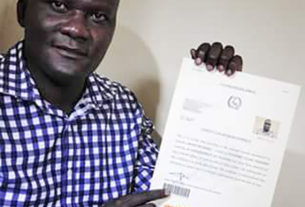With the number of private security guards on the verge of equaling and soon outstripping that of the police force, government has put in place tough measures to monitor and control the operations of private security organisations – PSOs – operating in the country.
Police Tightens control over Private Security Companies
With the number of private security guards on the verge of equaling and soon outstripping that of the police force, government has put in place tough measures to monitor and control the operations of private security organisations – PSOs – operating in the country.
The binding guidelines are contained in Statutory Instrument No.11 of 2013, which restates the powers of the Inspector General of Police (IGP) to supervise and regulate the activities PSOs in Uganda. The authority to issue, suspend and cancel licences for PSOs is vested in the IGP. The IGP in turn delegates the day to day monitoring of the PSOs to the Regional and Divisional Police Commanders (RPCs and DPCs.
Private security services are now a reality and PSOs are recognized as supplementing the work of the police. They are also in many cases the first responder to crime who call in the police. The growth of the country’s economy has fueled the demand by private sector business and homes for private security services. The demand has been growing and continues to grow due to a number of factors, including the fact that PSOs undertake to compensate for losses that their clients may incur while the contract with the security company is in force. But to safeguard the rights of the clients and quality of service due to them and also national security concerns, the government finds it inevitable that the operations and operational standards of PSOs be subject to strict regulation, a function that it exercises through the Police.
A- Obligations of the Security companies:
The instrument that contains a set of obligations to be fulfilled by the PSOs if they are to remain in business has been circulated to all stakeholders. They touch on recruitment and management of operational personnel, management and procurement of firearms and maintainance of quality operational standards. The Police on its part is expected to monitor and maintain the standards of training and recruitment procedures that the PSOs are required to adhere to.
*PSOs among other things must provide quality service to their clients. DPCs who supervise the operations of PSOs in their areas must at all times ensure that the operational staff of these private organization abide to the standard minimum code of conduct that they have signed on.
*A PSO must ensure that its uniforms are described in a gazette notice, that its uniform must not resemble that of any government security force or that of another PSO.
*PSOs must pay the wages and allowances to their employees promptly. To this end, they must file their mothly salary accounts with the police to ensure they are complying with this requirement.
*PSOs are NOT allowed to deduct any money from guards to cater for the uniforms and other equipment that they use. This transfer of such cost to employees is strictly forbidden.
*The employers must take out appropriate insurance cover for their employees. Police is expected to check that all guards are insured due to the nature of the risks involved in their work.
*The PSOs must obtain and have all the necessary licences stipulated in the law before engaging in security operations.
*It is also a requirement for PSOs to report to the district CID officer any investigations they may be conducting of a criminal nature, and to give a final report at the end of every investigation.
*The PSOs are also required to ensure strict observance of human rights by their employees.
*PSOs must also keep regular contact with police and to notify police of any incidents that may require specialised police services.
* PSO must not employ non-Ugandans except with the express permission of the IGP
*No director of a PSO can travel out of country without permission of IGP
*Any staff of a PSO traveling outside the country must be authorised by their Managing Director, who in turn must report to IGP staff who have traveled out of the country.
*PSO are required to file all particulars of their staff including fingerprints within two weeks of employment to IGP, and to file quarterly staff returns.
* PSOs are not allowed to engaging in debt collection
* PSOs have to ensure that the training their personnel undergo is only conducted by in a certified institution by certified instructors.
*Every PSOs must make a report to IGP of its operations every 3 months
B- Obligations of the Police
The Inspector General of Police is tasked by government to ensure that the PSOs provide quality service to clients, use firearms in their custody properly and keep them safely. The IGP must also ensure that PSO personnel meet minimum standards of operational capability and discipline. The RPCs and DPCs carry out the day to day fucntioons of overseeing the PSOs on behalf of the IGP. Every year, the IGP must issue an assessment certificate for each PSO in the country.
* The IGP must set standards of training and performance and ensure that they are adhered to.
*It is the duty of the IGP to ensure that PSOs use, store and dispose of firearms properly. DPCs must check continuously on the maintenance standards for firearms. -ensure minimal risk to employs of PSOs.
*It is the IGP to approve all arms held by every PSO. All arms purchases and importation must follow the procedures spelt out and confirmed by the IGP before authorization by the minister of international affairs.
*As a rule, all firearms held by a PSO must be checked every four months by IGP’s staff.
*All PSO personnel using firearms must be trained according to standards set by IGP, and they must be approved, certified and licensed as individuals. Police must confirm that any guard carrying a firearm is indeed licensed to do so. Any guard carrying a firearm must have his firearm licence on him at all times that he is carrying an arm.
*The IGP must ensure that an arms register is kept by every PSO and that it is updated and that returns on forearms and ammunition are filed every single month.
*All movement of fire arms for deployment or for repair must only be undertaken under permit issued only by the IGP, DPC or RPC.
IGP must inspect every PSO’s armory, arms and ammunition every four months.
*Police must ensure that PSO personnel account for use of firearms- they are only allowed to do so according to the regulations ie in self defence or defence of another person in danger of grave injury or death, to stop fleeing suspect after offense is committed or to stop serious threat to lifer if police cannot be called in immediately
*In ensuring that forearms are properly used, a DPCs is empowered to impound and all guns from a PSO.
*Police must ensure that all PSO employees are vetted
* DPCs must ensure adherence to government policies on security by all PSOs, and inspect on their compliance and
report to IGP.
*DPC must monitor deployment and training activities in PSOs
*District security Committees must oversee recruitment by PSOs, and keep the IGP updated on the total number of PSOs operating in their district.
*The RPC must also carry out an inspection every three months of PSOs in the area and submit a report to IGP
*The DPC must report monthly to IGP on personnel strength of every PSO operating in their area
*DPC must report every month on the number of firearms held by every PSO and the condition of the arms
*DPC must report to IGP any and all crimes committed by PSO operational personnel every month.
*DPC must report details of the methods of deployment of every PSO to the IGP.
C- And now under the new order…
The PSO operate independently of one another, There are a couple of associations which do not necessarily agree on some things. Those who managed to address a recent meeting of top police management recently strongly expresses the need for a database on all security guards in the country, as this would reduce the chances of their recruiting wrong elements.
The PSOs observed that the absence of a national Identity card is a major hindrance to security operations as there is no where to start when vetting an individual.
PSOs also proposed the setting up of an Authority to regulate their sector, saying they authority would be better facilitated than the police since it would be funded not only by government but also by fees payable by the security firms.
The PSOs also appealed to government to invest enforce investment in modern security basics like CCTV surveillance cameras in all places frequented by the public.
They IGP shall be issuing an annual performance report for every PSO in the country. The certificate shall indicate the graded as either A- exemplary B- very good C- good D- satisfactory or E- poor
When IGP is satisfied that a PSO is operating below prescribed standards, or that a PSO poses a security risk, or if a PSO is not compliant with the regulations, the registrar general shall cancel its registration and the PSO will surrender its equipment and uniforms to UGP for disposal.
PSO must clear with DPC before setting up in his region. So no PSO can enter a police division, that means no PSO can set up anywhere, without contacting the DPC, and IGP cannot allow a PSO to set up shop without notifying the relevant DPC, so DPC are warned not to hear about alleged IGP permissions unless they come from the IGP.
D- Comparison and background
Uganda has slightly over one hundred security companies; Tanzania 400 and Kenya 4,000 security companies!
The main attraction of PSOs is that they undertake compensation in case of loss
In Kenya, PSOs are not regukated by a single government authority, but they also don’t carry firearms
Traditionally, the image of PSOs was that of underrated and underpaid guards with low education, profit motivated and employment of last resort.
The changing perception of PSOs has been anhanced as they became large taxpayers, started attracting talent in the market, hiring international expertise, investment in high technology and paying better salaries.
Still entry into the industry has been too easy, allowing many operators with little capital and managerial capabilities to set up incompetent PSOs. For example, several use guns hired from the Police which they maintain very poorly. So awful is their weapons maintainance culture that the cruel joke in Police is that they lease firearms and shortly afterwards return firewood. Sadly, it true because many guns after being handled by PSOs are only fit for disposal. The new guidelines are set to change this situation for the better.




